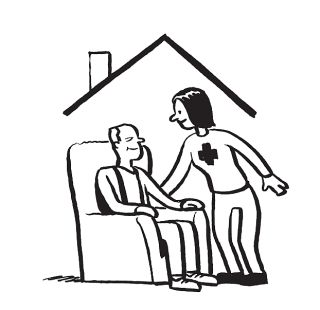Investment in Homecare - Supporting a Basic Standard of Living

According to the Safeguarding Ireland / Red C Place of Care survey, just 20% of all adults aged 18+ have given some consideration to where they would like to be cared for. When broken down by age it is perhaps unsurprising that the prevalence of consideration increases with age. Just 10% of adults aged 18-34 have considered their care, compared to 43% of those aged 65+.
When asked the specific question "Q.3 If you did not have the capacity to make a decision on your own due to a serious illness or frailty, to what extent would you be happy or unhappy with each of the following as your Place of Care?" 85% of adults said responded that they would be happy to be cared for in their own home with necessary supports, 25% of respondents would be happy in a nursing home and 19% would be happy being cared for in a hospital. This 85% rises to 90% for those aged 55-65 and those aged 65+, and decreases to 82% across the other age groups.
Research published last year by the ESRI indicated that the need for home care is largely concentrated in households aged over 65[1] and that only 42% of people over 65 with a self-reported need actually receive formal home care. Unmet need for home care is greatest in those aged over 65, with 38% of those reporting a need for home care indicating that this need is unmet.
By the end of September 2019, 13,314,651 home support hours were delivered to older persons (not including those in receipt of the Intensive Home Care Package)[2]. A total of 47,384 people were in receipt of these hours during that period, 5,531 less than the same period in 2018. This gives an average of 281 hours each for the year, or 5.4 hours per week. This average is below what would be considered for home care in other countries, and delivers an estimated 42% of the actual need in Ireland.
The cost of an hour of home care is €24, which would place the cost of home care for the first nine months of last year at €319.5 million, this is roughly half the cost of nursing home care for the same period.
The right to age well at home is a basic one. A statutory basis for home care has been called for by Social Justice Ireland and moves in this direction are welcome. However, supporting people to live at home requires an integrated approach that ensures access to a range of supports in the home as well as transitional facilities. To achieve this, deficits in infrastructure need to be addressed urgently with an emphasis on replacement and/or refurbishment of facilities. If this is not done, the inappropriate admission of older people to acute care facilities will continue with consequent negative effects on acute services and unnecessary stress on people and their families. A related issue is the shortage of short-stay community beds intended to enable people to return to their own homes after a period of intervention and support (including step-up, step-down, convalescence, assessment and review, respite and rehabilitation services).
[1] Privalko. I., Maître, B., Watson, and D., Grotti, R. (2019): Access to Care Services Across Europe, Dublin: Department of Employment Affairs and Social Protection and Economic and Social Research Institute
[2] HSE Performance Profile, July to September 2019, Quarterly Report